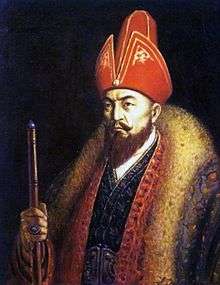Ablai Khan
| Ablai Khan | |||||
|---|---|---|---|---|---|
| Khan | |||||
 | |||||
| Reign | 1771–1781 | ||||
| Coronation | 1771 | ||||
| Predecessor | Abul-Mambet Khan | ||||
| Born | 1711 | ||||
| Died | May 23, 1781 (aged 70) | ||||
| |||||
| House | Urus Khan | ||||
| Father | Korkem Wali | ||||
| Religion | Islam | ||||
Wali-ullah Abul-Mansur Khan better known as Ablai Khan (Kazakh: Абылай (Әбілмансұр) хан) (1711 — May 23, 1781) was a Kazakh khan of the Middle jüz of Kazakhstan.
Born as Wali-ullah Abul-Mansur Khan, Ablai Khan belonged to the senior branch of descendants of the 15th century founder of the Kazakh state, Janybek Khan. In the first half of the 18th century, Ablai Khan proved to be a talented organizer and commander as he headed detachments of the Kazakh militia fighting the Dzungars. He participated in the most significant battles against the Dzungars from the 1720s to the 1750s, for which he was declared a "batyr" ("hero") by the people.
Ablai's activity aimed to create a strong and independent Kazakh state. He headed the unified forces of the Kazakhs and furthered the centralization of state power in Kazakhstan. Until his election as the khan of the three jüzes, Ablai had to compete with Khan Abul Mambet and his descendants of Middle jüz for leadership. Initially, Russia recognized Abul-Mambet Khan as the Khan of Middle jüz, while Ablai was supported by China. Ablai's talent in playing China against Russia gradually made him the unrivaled Khan of the steppe. Unlike Abul Khair Khan of Little jüz, Ablai never submitted to Russian rule. In 1771, at the meeting of the representatives of the three jüzes, Ablai was elected as the Kazakh khan. The Russian Empress requested that the title of khan should be recognized and officially approved by Russia. To that end, she sent an official letter to Petropavl, where Ablai was expected to receive the title in 1779. He never showed up at the fort, declining Russia's request to appoint him as the khan of Middle jüz. In contrast to Ablai, other khans and sultans had been competing for the lavish gifts and stipends of the Emperors of Russia in return for their submission.
During the Qing campaigns against the Dzungars, Ablai Khan chose not to take sides. He sheltered the Dzungar Oirat taishis Amursana and Dawachi from attacks by the Khoshut-Orait King of Tibet, Lha-bzang Khan, as the Dzungar Khanate fractured following the death of Galdan Tseren in 1745. However, once Amursana and Dawachi were no longer allies, Ablai Khan took the opportunity to capture herds and territory from the Dzungars.[1]
During Amursana's rebellion against the Qing in 1755-56, Ablai Khan offered him sanctuary at one point and refused to hand him over despite the threat of a raid on his territory. However, by 1757, Ablai Khan had acknowledged Chinese suzerainty.[2] Ablai was then confirmed as Kazakh Khan by both the Chinese and the Russians. He led numerous campaigns against Khanate of Kokand and the Kyrgyz. In the last campaign his troops liberated many cities in Southern Kazakhstan and even captured Tashkent. Then he proceeded to present-day Kyrgyzstan and won a furious battle with troops of local warlords. Upon his death in 1781 he was interred in the Mausoleum of Khoja Ahmed Yasavi in Hazrat-e Turkestan.
Legacy
- One of his descendants is Shokan Walikhanuli (1835-1865), a Kazakh scholar and historian.
- Abylai Khan University, founded in 1941, is named after Ablai Khan.
- In 1993, Ablai Khan appeared on the 100 Kazakhstani tenge banknote.[3]
- The life of Ablai Khan is the subject of the 2005 Kazakhstani film Nomad.
See also
References
- ↑ Perdue, Peter C (2009). China Marches West: The Qing Conquest of Central Eurasia. Harvard University Press. p. 274. ISBN 978-0-674-04202-5.
- ↑ Hummel, Arthur William (1944). Eminent Chinese of the Ch'ing Period (1644-1912). Eds. US Government Printing Office. p. 10.
- ↑ Kazakhstan 100 Tenge Banknote.ws
Sources
- Alexei I. Levshin, Opisanie kirgiz-kazach’ikh ili kirgiz-kaisatskikh ord i stepei (St. Petersburg,. 1832).
- "Famous Kazakhs". Archived from the original on 2007-12-21. Retrieved 2006-09-26. Website on the Kazakh Diaspora
- History of Kazakhstan to 1700 Encyclopædia Britannica Online.